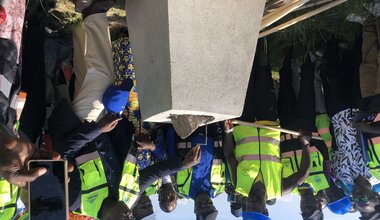MONUSCO’s mediation efforts in Equateur province

Mbandaka, 30 November 2012 – After a month-long dispute between the Governor of Equateur province, Jean-Claude Baende, and the Provincial Assembly Speaker, Jean-Gontran Ibambe, the two local authorities are back to a cordial relationship thanks to mediation efforts of the United Nations organization Stabilization Mission in the Democratic Republic of Congo (MONUSCO).
Relations between Governor Baende and Speaker Ibambe turned sour towards the end of October, when the former accused the Provincial Assembly's new Permanent Bureau, led by the latter, of seeking to unseat him with a non-confidence vote in the Assembly. Speaker Ibambe dismissed the accusation as "an attempt to outrun the problem – an attempt by a governor who has a poor record" and who uses violence as a way to maintain himself in office. This deleterious climate provoked the disruption of a plenary session of the National Assembly on 28 November, when a gang of armed youths, known as "Kulunas" tried to storm into the Provincial Assembly building, causing the police to fire warning shots into the air to prevent them. Several of these youngsters were injured and several others arrested as a result of the police intervention.
Following these incidents, an ad hoc committee was set up and mandated to close down the Provincial Assembly until a solution would be found. As it turned out, this decision further heightened tensions, prompting MONUSCO Head of office in Equateur, Ould Mohamed El Hacen Mohamed Abdellahi, to step in to offer his good offices in resolving this crisis.
On Thursday, 29 November, Mr.El Hacen Mohamed Abdellahi met separately with both parties to this conflict, and then later in the day, met with them around the same table. During these discussions, the MONUSCO mediator managed to get both sides to agree that the Provincial Assembly building should be immediately reopened and made available to the members of the Provincial Assembly and to its Permanent Bureau, in order to allow them to perform ordinary administrative tasks, pending the achievement of a final and lasting solution to the crisis.
Jean-Tobie Okala / MONUSCO
 UN
UN United Nations Peacekeeping
United Nations Peacekeeping




